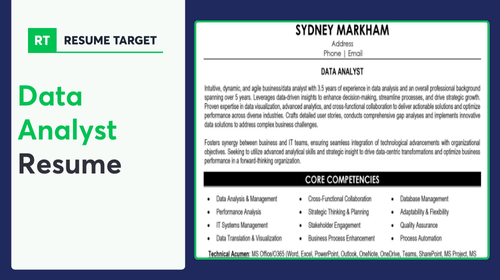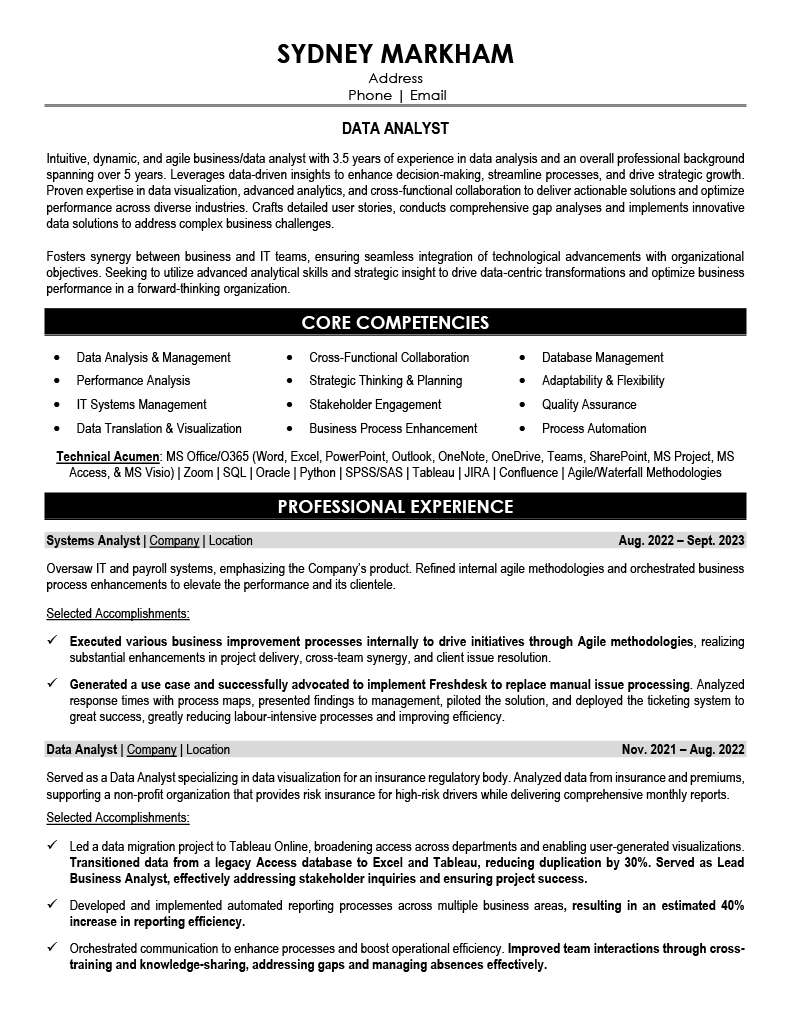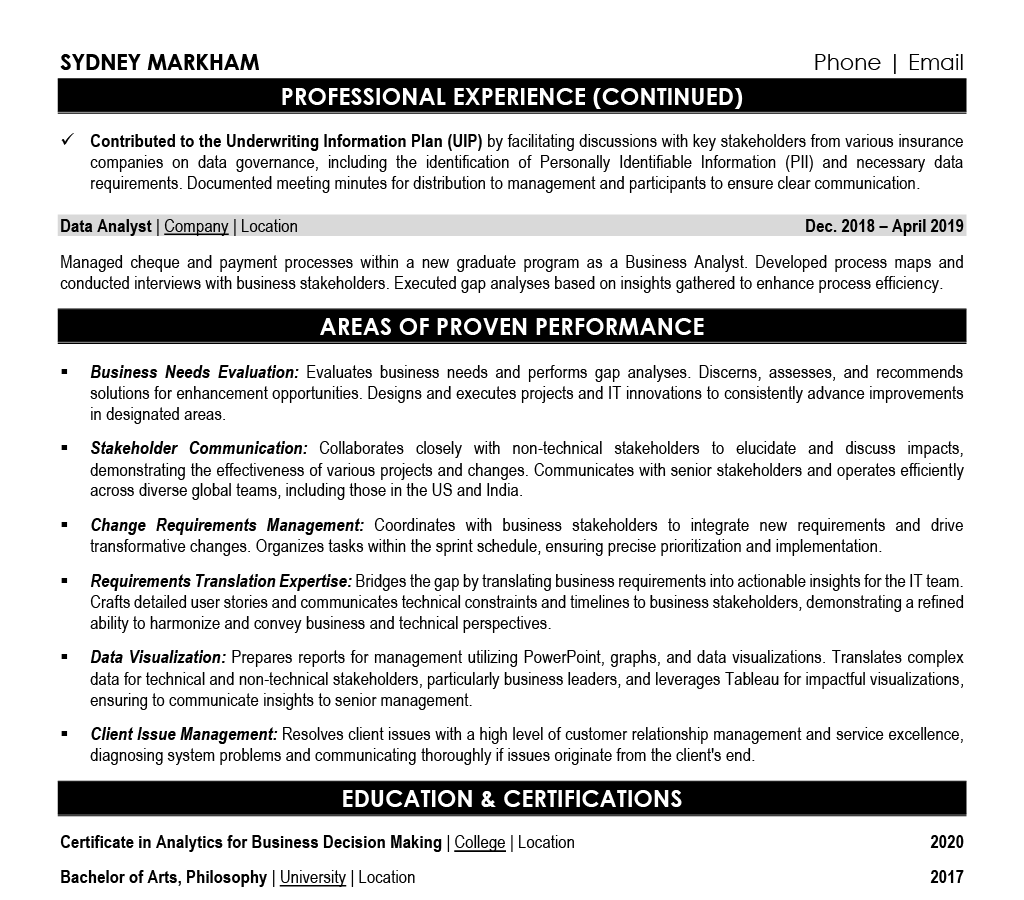

Numbers tell stories, but many data analysts struggle to tell their own career story effectively. Your technical skills are solid, but your resume might not show your true business impact.
Are you finding it challenging to translate complex analytics projects into compelling resume achievements? A well-crafted resume needs to bridge the gap between technical expertise and business value you've delivered.
Resume Target specializes in helping data analysts showcase both technical prowess and business impact. This guide will show you exactly how to transform your experience into a resume that gets hiring managers excited to meet you.


In today's data-driven world, Data Analysts serve as modern-day detectives who transform raw information into actionable insights, with studies showing they can help businesses achieve up to 73% improvement in their strategic decision-making.
Using a powerful combination of statistical analysis, programming languages like Python and R, and visualization tools, you'll dig deep into complex datasets to uncover patterns, solve business problems, and communicate findings that drive real organizational change.
Whether you're just starting out or looking to advance your career, the data analysis field offers diverse opportunities for growth, from specializing in specific industries like healthcare or finance to advancing into senior analyst or data science roles - let's explore how you can chart your path in this dynamic field.
Here's what's exciting about pursuing a career as a Data Analyst - your earning potential can grow substantially as you gain experience and develop specialized skills. The field offers impressive compensation packages, with opportunities to significantly increase your earnings as you master tools like SQL and advance your statistical analysis expertise.
Figures from: Discover Data Science
Data Analysts can progress from entry-level to executive positions through skill development and experience. Your career path offers multiple advancement opportunities as companies increasingly rely on data-driven decisions.
To accelerate your career growth, you'll need to master both technical expertise and essential soft skills that set you apart in the data analytics field.
- SQL and Database Management - Python/R Programming - Advanced Data Visualization - Strategic Communication and PresentationBreaking into data analytics is achievable through a combination of technical training, practical experience, and strategic networking - even without previous experience in the field.
To advance your career as a data analyst, you'll need to master key technical skills including SQL, Microsoft Excel, and Python or R programming, while developing essential soft skills like critical thinking and communication.
Requirements from CIO
Data Analyst roles are booming across tech hubs and major business centers, with IT and healthcare leading the charge.
Figures from Noble Desktop
Struggling to translate your SQL queries, data visualization skills, and analytical achievements into a compelling resume that hiring managers will actually want to read? This comprehensive, section-by-section guide will walk you through exactly how to create a data analyst resume that showcases your technical expertise and business impact.
If you're like most data analysts, translating your technical expertise into a compelling resume summary feels about as challenging as debugging a complex SQL query with missing data points.
While you excel at transforming raw data into actionable insights, capturing your ability to blend statistical analysis, data visualization, and business intelligence into a few powerful sentences can seem overwhelming - yet it's exactly what hiring managers need to see to understand your true value.
How would you describe your unique blend of technical skills and business acumen in transforming raw data into actionable insights?
Reason: This helps frame your value proposition by highlighting the crucial bridge between technical expertise and business impact that defines a successful Data Analyst. It encourages you to think about your overall professional identity rather than individual accomplishments.
What are the primary industries or types of data you've specialized in throughout your career, and how has this shaped your analytical approach?
Reason: This question helps establish your professional context and domain expertise, allowing you to craft a summary that immediately resonates with your target employer's sector or data environment.
How would you characterize your role in driving data-driven decision making within organizations, particularly in terms of stakeholder collaboration and communication?
Reason: This prompts you to articulate your strategic value beyond technical skills, emphasizing the crucial soft skills and business partnership aspects that distinguish senior Data Analysts from purely technical practitioners.
As a Data Analyst, you'll need to showcase both technical expertise and business acumen, from programming languages and visualization tools to problem-solving capabilities.
Your skills section should highlight your proficiency with popular tools like SQL, Python, and Tableau, while also emphasizing crucial soft skills such as data storytelling and cross-functional collaboration.
Showcase your analytical expertise by structuring your work history into three powerful segments: a concise role overview that sets the stage, measurable achievements that highlight your impact with data, and core responsibilities that demonstrate your technical and business intelligence capabilities.
Many Data Analysts struggle to translate their technical work with databases and datasets into clear business value for hiring managers. Transform your complex analytical projects into compelling success stories by connecting your data insights directly to revenue growth, cost savings, and operational efficiency improvements.
The responsibilities section demonstrates how Data Analysts transform raw data into actionable business insights. This section should clearly show how you collect, analyze, and present data while connecting your technical skills to measurable business outcomes that non-technical hiring managers can understand.
Your educational background and professional certifications demonstrate your commitment to data analytics excellence. List your most relevant qualifications first, especially those involving SQL, data visualization, or statistical analysis, and include any specialized training in tools like Tableau, Python, or R.
Now that you've created a strong foundation using Resume Target's comprehensive resume writing guidelines, you're ready to transform your resume into a powerful tool for landing data analyst positions.
While many job seekers only customize their cover letters, tailoring your resume for specific data analyst roles is crucial in today's competitive job market, where every detail counts.
A customized resume not only helps you bypass ATS systems by incorporating role-specific keywords, but it also demonstrates to hiring managers that your analytical skills and experience align perfectly with their unique data needs and company culture.
Ready to stand out from other candidates? Let's turn your resume into a laser-focused presentation that proves you're the data analyst they've been searching for!
Don't let a lack of work experience hold you back from launching your career as a Data Analyst!
Your resume can shine by highlighting your educational background in statistics, programming, or related fields, along with any relevant projects, internships, or data-focused coursework you've completed.
Focus on showcasing your technical skills, analytical capabilities, and problem-solving abilities as the three key elements of your resume.
For more detailed guidance on structuring your entry-level resume, check out the Student Resume Writing Guide to help you stand out to potential employers.
Your resume summary is your chance to showcase how your academic excellence, technical projects, and analytical mindset make you an ideal candidate for a data analyst role.
Focus on highlighting your relevant coursework, data-driven projects, and any internship experiences that demonstrate your ability to transform raw data into meaningful insights.
"Detail-oriented and technically proficient recent graduate with comprehensive training in data analytics and visualization tools including Python, SQL, and Tableau. Successfully completed three data analysis projects during academic career, including a predictive modeling project that achieved 92% accuracy. Demonstrated expertise in statistical analysis and data cleaning through university research assistantship. Seeking to leverage strong analytical and problem-solving abilities to drive data-informed decision making as a Data Analyst."
Now's your chance to showcase the academic foundation that powers your data analysis expertise - from statistics courses to programming certifications!
Transform your educational background into compelling content by highlighting relevant coursework like Advanced SQL, Statistical Analysis, or Data Visualization, plus any capstone projects where you analyzed real datasets to solve business problems.
unavailableRelevant Coursework: Statistics and Probability | Database Management | Data Visualization | Business Analytics | Python Programming | Machine Learning Fundamentals
Key Projects:
Customer Churn Analysis Dashboard: Developed an interactive visualization dashboard to analyze customer retention patterns for a subscription-based service, resulting in identification of key churn indicators and a 15% improvement in customer retention strategies.
Sales Prediction Model: Collaborated with a four-person team to build a predictive model for retail sales forecasting, enabling more accurate inventory management and resource allocation.
Leverage your academic training, technical certifications, and hands-on project experience to create a powerful skills section that showcases your ability to transform raw data into meaningful insights.
As an aspiring Data Analyst, highlighting these foundational skills demonstrates your readiness to tackle real-world data challenges, positioning you well for the growing number of opportunities in data analytics across industries.
Let's face it - translating complex SQL queries, data visualization projects, and technical achievements into language that both hiring managers and ATS systems can understand feels like trying to merge incompatible datasets.
At Resume Target, we specialize in crafting resumes for data professionals that bridge the technical-business divide, having helped hundreds of analysts showcase their impact through clear metrics and achievements.
Our deep understanding of the technology sector means we know exactly how to position your Python expertise, dashboard creation, and business intelligence wins to catch a hiring manager's eye.
With companies rapidly expanding their data teams and competition for top roles intensifying, now is the time to transform your technical experience into a compelling career story - let's connect today to get started.
Impress any hiring manager with our Technology resume writing service. We work with all career levels and types of Technology professionals.
Learn More → Technology Resume Writing Services